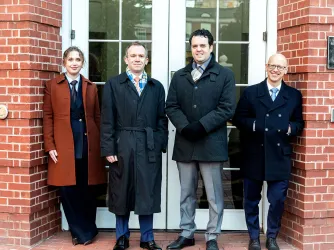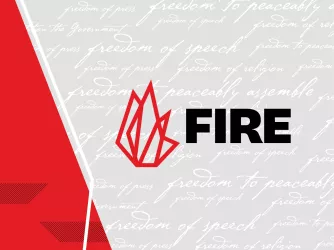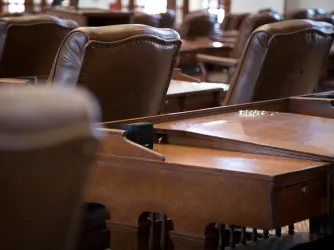Table of Contents
Sectarian Institutions and Free Speech
As mentioned in previous blog entries, George Mason University Professor Jon B. Gould’s call for the dissolution of FIRE (subscribers only, unfortunately) in The Chronicle of Higher Education’s Review section is riddled with mischaracterizations and inaccuracies. Having disproved his example of FIRE’s “exaggeration” of speech codes and pointed out his questionable understanding of how sexual harassment regulations are constructed on campus, we would like to turn now to his contention that FIRE does not much care about censorship on sectarian religious campuses:
One need only look at FIRE’s Web site. During the first week of February this year, half of the top stories involved private institutions—which FIRE’s former leader said should be permitted to “set up their own systems” of speech regulation. FIRE featured Brown, Johns Hopkins, and Pace Universities, two of which were excoriated for alleged discrimination against Christian students.
If FIRE is going to criticize private as well as public institutions—and especially if it has taken on the cause of religious liberty — where is the group’s outrage when sectarian institutions restrict speech or deny academic freedom? To be sure, FIRE recognizes that some private colleges hold “a certain set of values above a commitment to free speech,” but there are many cases in which sectarian colleges have silenced students or faculty members apart from their denomination's canons. Why do we not see press releases, except in the rarest cases, from FIRE championing its advocacy of those victims?
Not only is Gould flat wrong, but he doesn’t even seem to have done his most basic homework when he accuses FIRE of only rarely helping victims of individual rights violations from sectarian campuses. In about five minutes on FIRE’s website, I pulled up the following sectarian schools where FIRE has taken cases: Albright College, Catholic University of America, College of the Holy Cross, DePaul University (three cases), Gonzaga University (two cases), Le Moyne College (two cases), Marquette University, Marywood University, and I just stopped at the “M’s” because that’s already twelve cases, representing an even greater number of letters, press releases, and blog entries.
What FIRE demands from every private school, religious or otherwise, is this: truth in advertising. Gould quotes our former executive director as saying that private institutions can “set up their own systems” of speech regulation. Correct. What FIRE is an absolute stickler about is holding these schools to any promises of free speech they make. When we find a school that professes to value free expression or academic freedom, we evaluate its speech codes to see if its rules reflect those values. Insofar as FIRE judges that a private school has explicitly and conspicuously said that some value is more important than freedom of expression, or religion, or due process, FIRE will respect this priority. Bard College in New York State is a good example of this. While, like most schools (private or public), it talks about the value of freedom of expression, it also says the following:
When language or other expression is used to harm, to demean or to incite violence, it has breached the standard of civility in communication on this campus. Conduct that deliberately causes embarrassment, discomfort, or injury to other individuals or to the community, as a whole, is explicitly not allowed. There will be no tolerance for dangerous and vulgar behavior intended to injure. (Emphasis in original.)
This language is extremely explicit and conspicuous—it’s on page five of Bard’s student handbook. Therefore, FIRE simply would not take a case from a Bard student who was accused of, for instance, “vulgar” behavior. The same goes for a sectarian school like Brigham Young University, whose policies read, in part:
Since all human beings are children of Heavenly Father, they are literally our spiritual brothers and sisters. Expressions such as racial slurs in writing, in speech, in print, or in recordings that demean any person, self, or others are not acceptable.
As representatives of the university, members of the university community are expected to avoid the use of profane, crude, or demeaning language about themselves, others, or the university.
At Brigham Young, some speech just is not acceptable, and every student is extremely likely to know it. FIRE has never taken a case at Brigham Young either, and does not rate the school in our Spotlight database. But most schools, sectarian or otherwise, do not explicitly disavow freedom of expression. To the contrary, most guarantee some form of it. DePaul University, one of the most frequent offenders against freedom of expression, says this:
Students have the right to their own ideas, beliefs and political associations. Students have the right to ask questions and express their opinions without affecting their academic evaluations, as long as such do not interfere with the normal operations of their classes or infringe on the rights of other students in their classes.
What’s more, in a 2005 letter to FIRE, DePaul President Holtschneider told us directly that “DePaul University strongly supports free speech.” So when DePaul told a student group that it couldn’t protest a campus visit by Ward Churchill, who famously called the victims of the September 11, 2001, attack on the World Trade Center “little Eichmanns,” FIRE came to the group’s defense (we also defended Churchill’s right to his comments about the attacks).
Expecting FIRE, as Gould apparently does, to come to the defense of every person whose freedom of expression is impaired at a sectarian university that doesn’t even guarantee free speech is unreasonable, nonsensical, and just plain wrong. It is unreasonable because a university that explicitly doesn’t value free expression is unlikely to care what a group dedicated to free expression has to say about its policies. It is nonsensical because those who learn or teach at a university that expressly and conspicuously restricts expression have knowingly agreed to be bound by those rules and may even be there because of them (there’s a reason so many Mormons go to BYU). And it’s just plain wrong because for FIRE to try to force private universities to honor free expression when they are explicitly and conspicuously organized around shared ideals that rule out free expression would impair the freedom of expression of those who choose to attend such institutions.
It is an entirely different matter when a private institution, such as DePaul (or heck, Harvard), holds itself out as a place where free speech is valued, but then denies students that right upon their arrival on campus. Unlike students at Bard or at BYU, students at DePaul and at the other private institutions that promise free speech have not knowingly consented to giving up their free speech rights, since they cannot fairly be expected to read a statement guaranteeing free expression and begin immediately looking through every college policy to find the prohibitions on expression that might still be lurking. Universities must not be allowed to make broad promises of freedom to lure talented students and faculty members to campus and then deny them those rights once they arrive. Gould says, more or less accurately, that it is FIRE’s position that we do “not oppose private-college speech codes if the rule makers [are] honest about them,” but even here he leaves out an important point: in FIRE’s view, being “honest” about something as serious as restrictions on fundamental rights requires a level of candor that is severely lacking at too many colleges.
Recent Articles
Get the latest free speech news and analysis from FIRE.

VICTORY: Jury finds Tennessee high school student’s suspension for sharing memes violated the First Amendment

DOJ must not investigate elected officials for criticizing immigration enforcement

FIRE statement on calls to ban X in EU, UK
